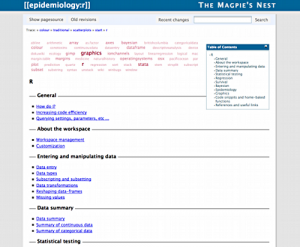From the first time I met one, I took to wikis for information gathering like a bluebottle fly to an old fish-head, partly because of their non-linear nature, and partly, since they were web-based, I could style and lay them out to suit myself. With a wiki, I can start collection information at any point and with the most rudimentary framework, grow and restructure at will, design my own menus, and create multiple cross-links between entries. My present wiki engines of choice are DokuWiki and Tiddlywiki. DokuWiki was originally designed for documentation in small companies, which makes it ideal for my present challenge of keeping up with my learning on four different stats packages (R, SAS, STATA and WinBUGS). I keep programming notes, reusable code snippets, a personal Rosetta stone of command-equivalents, and lists of links and references in the form of a DokuWiki run on a MAMP server (see below) on my MacBook.
Familiarity breeds comfort, but DokuWiki’s advantages are that I have found it straightforward to install and configure (particularly now that the user access controls are provided through a web interface), it is FOSS and platform independent, the developer is actively maintaining it, there is an active user community, the mark-up syntax is easy to work with and readable in the raw, and it does not require a database but writes everything to flat-files and folders. The latter, for me, is a key point: at my scale of operations, flat-files are just fine, and they have the major advantage that they are program- and platform-independent. There’s no database to get corrupted (been there, done that). There’s no vendor lock-in. If I ever want to migrate, I probably won’t be alone and someone will have written a tool; even if they haven’t, flat-files, meet Perl; I know you know each other .
For comparisons of wiki software, see the relevant page on wikipedia and WikiMatrix. A sampling of reviews: From Open Source Magazine (Badger, 2007), and Linux.com (Popov, 2008). Implementations I’ve noticed around the web are DokuWiki’s own wiki and the Zotero documentation.
As for the platform, I’ve used the built-in OSX server in the past, but turning on the OSX server involved opening ports that I didn’t necessarily want open, even if I had been confident in my editing of .htaccess. So when I found out about WAMP, I went looking for a Mac version. MAMP, which is intended as a development server with Apache, PHP, MySQL, and Perl. Download and installation of MAMP were straightforward with the help of an on-line tutorial and instructions, and from there it was a matter of setting up and configuring DokuWiki according to the instructions, with a little help from the equivalent instructions for WordPress – blogging software is a possible alternative to a wiki for keeping notes, if they are more linear.
